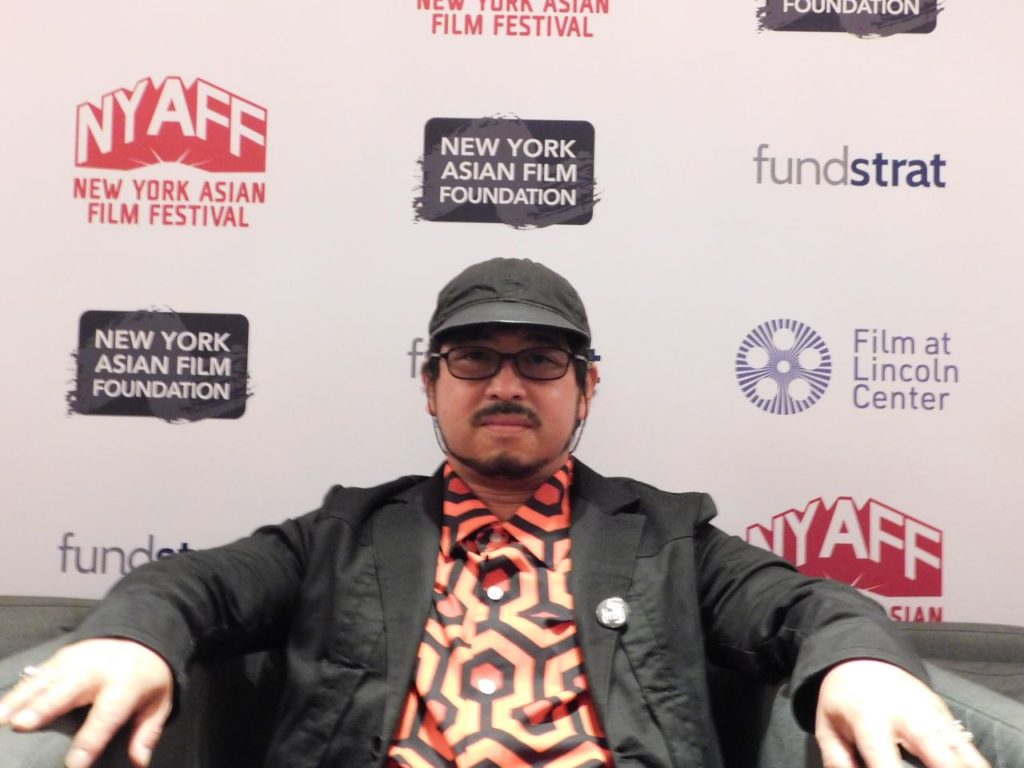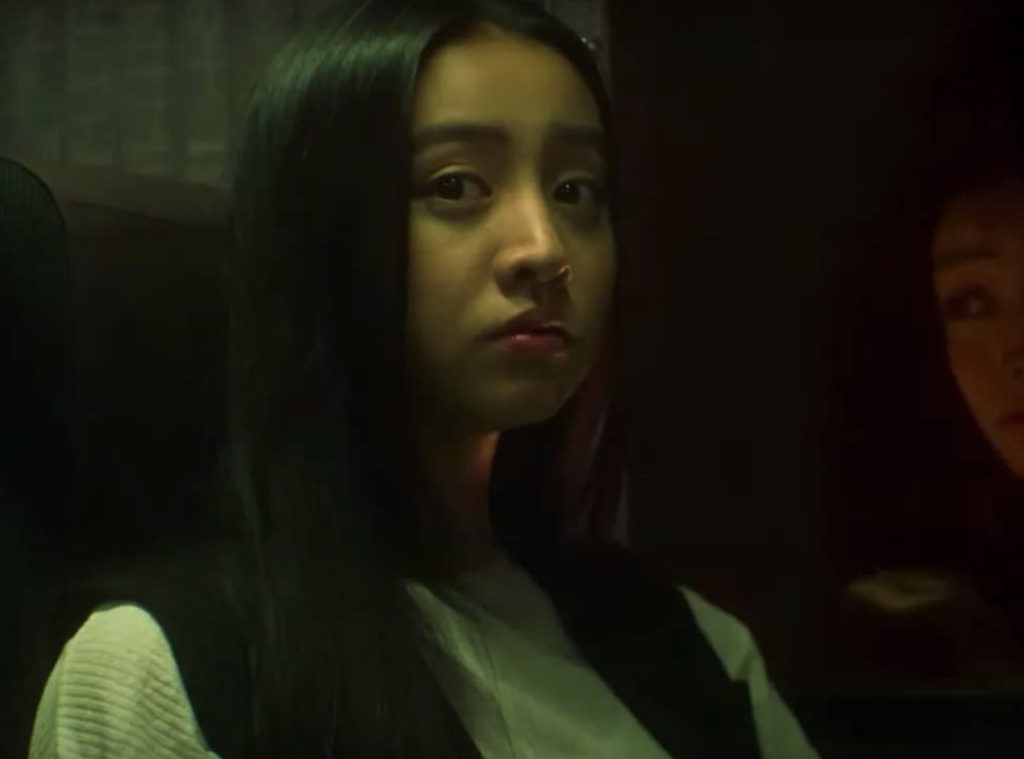
Ox-Head Village is a 2022 Japan-Japanese language movie, directed by Takashi Shimizu and written by Daisuke Hosaka, Takashi Shimizu. Synopsis : In a so-called “spirit video”, Kanon (Kôki) is astonished to see a high-school girl who looks exactly like her.

Exclusive Interview with Director Takashi Shimizu
Q: What kind of place is Tsubono Kosen (Mineral Spring), where this film is set? It seemed like a great place to shoot a horror movie.
Takashi Shimizu : About 25 years ago, it was actually a hot spring inn, and there was a Japanese word for mineral springs called Kosen. There was an inn that was immersed in the mineral spring that was built and used, but now it’s closed. Since then, the owner of the inn deserted this place which was surrounded only by rice fields. Every once in a while a motorcycle gang or young woman comes to this haunted place to test their courage. Nothing of the accidents happened at this place, but with the place in ruins, people say that ghosts will appear, and it has become a famous spot as a haunted place.
However, the people living around it are just annoyed by this [so-called] haunted place, and want it demolished as soon as possible, but the ownership has changed to another person, so the inn remains as it is. At first, the neighbors of Tsubono Kosen were terribly opposed to me because we wanted to use it for shooting in horror movies. So, while I conducted questionnaires and surveys locally, our producer from Toei, went to the site about once a week to attend the local meetings of the town and listened to the opinions of the residents. However, when I persuaded him to take the questionnaire at the end, the number of people who agreed with us increased, so I was able to use the site for shooting. At first, there were almost all dissenting opinions.
Actually, there was no accident or incident happened at the Tsubono Kosen, but there was an incident where two of high school girl went missing a little away from this Tsubono Kosen, so this incident has nothing to do with Tsubono Kosen, but the high school girl went out by telling their parents to go to the haunted place without permission, so people connected the missing incident to this haunted place.
The urban legend is that two high school girls went missing when this haunted place was closed. Perhaps the high school girls went out to be picked up by a boy, but couldn’t say so to their parents, so they said they would go with friends to the haunted place. In the end, the high school girls were missing since the mid 1990s and their decomposed bodies were discovered after being washed in from the sea a year before our film was shot. Because of that, I decided to stop using the actual case as it was, and felt that I was coming up with various ideas.
Q: In this film, actress Kōki plays two roles, Kanon and Shion. This film uses a lot of experiences unique to twins. Did you interview any twins in advance to research?
Takashi Shimizu: Before Kōki decided to appear in this film, I had a vague idea of tackling the story about twins before writing the script. Regardless of gender or age difference, I auditioned twin actors, talents, and comedians, even though I hadn’t decided whether I would make this story into a TV drama or a film yet. First, I auditioned twins, saying that I would audition them without saying what I was auditioning them for. During this process, I heard some mysterious and unique stories from the twins, and I’ve learned that people synchronize their feelings all the time with lies, while other twins tell of the mysterious story of singing the same song, humming at the same time in different locations.

Q: For Takashi Shimizu’s Village trilogy, Ayaka Miyoshi was cast in ”Howling Village.” Anna Yamada and Mayu Yamaguchi were cast in “Suicide Forest Village.” All of the experienced actresses were cast, but with “Ox-Head Village,” lead actress Kōki had no acting experience previously. What attracted you to Miss Kōki and why did you decide to cast her?
Takashi Shimizu: Though she’s not done acting before, Kōki was the daughter of renowned Japanese actor Takuya Kimura and singer Shizuka Kudo. I had some doubts about her acting ability, but Harue Miyake, a female producer who worked on the “Village” series, said, “I feel there’s a lot of potential with Kōki. I understand that you’re anxious about that as a director, but why don’t we set up a meeting with her?” When I actually met her, I felt something different about this girl.
She may be accustomed to standing in front of people as a model, but that’s not all. She knew I wanted to see her and she was aware of her lack of acting experience, so she said, “I know how hard it is to get such a person to play the leading role as well, but if you choose me I can play this.” She had a very solid attitude, and, at that point, I told her to take this kind of lesson and that kind of lesson. Even though she’s very mature for her age, she also possessed something childish. And she can only be in a debut film once.
After I talked to her, I didn’t want to lose Kōki to another director in another movie. In the end, I was honored to offer her her debut film, and even for an adult like me who is used to everything in the movie industry, I got a fresh feeling from her. Most of the experienced actors were surprised by her performance and how serious she was — and even though I told her to relax — she was so focused. Often, when you get used to acting, an actor will relax in rehearsal and know how to save it until the camera is rolling; she was all genuine even at the rehearsal stage.
Q: At the film’s beginning, there’s a scene where two high school girls are visiting a haunted place, They’re shooting a live show on Youtube. For that scene, what preparation did you do with actors, to get a live feeling for the audience?
Takashi Shimizu: I just set up the cellphone and handed it to them. At one point, I was thinking of shooting the scene with a cameraman, but if I did, it would have a different feeling, so we hid our staff in the corner of the building, and I didn’t tell the girls where they were. After that, I told them to do it freely until I said, “Cut.” So all the staff was hiding in one room of a pitch-black inn, making it feel like the girls were only shooting in the haunted place. I think the girls were really scared because they didn’t even know where the staff was.

Q: It’s been more than 20 years since your film, “Ju-On” [“The Grudge”] came out in Japan, how has the Japanese horror film changed in those 20 years since then?
Takashi Shimizu: With Japanese horror films, the boom of such series as “Rings” and “Ju-On” triggered the start of crude overproduction in Japan. Producers and directors who weren’t interested in horror films, started making them without care or research; their idea was that if they were all horror, they would make a bundle of the money. I felt that the horror movie ended with a boom, so I thought that a new horror director with fresh ideas would come out after that, but there weren’t many horror directors who have that kind of talent. In the end, director Hideo Nakata of “Ring” and I were still referred to as a Japanese horror, so, under the guidance of Mr. Kadokawa — who made the movie “Ring” — We made a Japanese horror movie award, which is is presented to young Japanese horror directors. We did it last year, and are planning to do the next one with me as the chairman of the judging committee.
I’m just in the recruitment period for those talents. Even if I do this kind of thing, it’s still hard for newcomers to come out. Horror movies aren’t going away, but I feel like they aren’t breathing fresh air lately. Films like “Ring” and “Ju-On” didn’t come out of nowhere. There was a low-budget film director, Norio Tsuruta, who replaced the ghost photograph in a movie. Director Kiyoshi Kurosawa, myself, and other directors and screenwriters were influenced by him. It would be great if that kind of nurturing soil (for young people) could grow in the Japanese horror industry. We see talented directors like Ari Aster and Jordan Peele who was originally a comedian, coming up, so I think it’s not strange [to believe that] such talents will come out in Japan soon.
Q: What’s missing in Japanese films?
Takashi Shimizu: I don’t think there are companies or producers who give opportunities to youth or young talents. Too often Japanese production companies turn a successful manga or bestselling novel into a film and hire popular actors who have gotten some recognition, so the Japanese productions are based on the safe bet. If this continues, the [larger] Japanese film industry won’t be sustainable. I try to go to student films as much as possible, so there are a lot of excellent directors. Even the major production companies like Toho and Toei producers are checking out young directors. I want them to come out more and more, so I think they’re also [checking out] horror directors. That’s why I launched the Horror Film Awards.

Q: This time, you were awarded the Lifetime Achievement Award at this year’s New York Asian Film Festival. What are your thoughts on this?
Takashi Shimizu: Fortunately, I’ve been a director since my 20s, so I’ve been doing it for a long time, but I didn’t think I would continue as a horror film director. I think this is a curse. (LOL) Horror movies tend to be underestimated, and I think they’re a genre of discrimination, so, of course, I don’t get to compete with proper human dramas. But even for me, it’s a great honor to receive such an award — in Japan, this is not the case. I wonder if I’m finally old enough to receive such an award. On the contrary, I wonder if it’s okay to get it at only 50 years old. In Japan, there’s still a seniority system, and I feel that I am still too young to be called a master. However, when I got this award yesterday, I went back to the hotel, and looked in the mirror. I noticed that my gray hair had increased significantly, and I was shocked to think, “Oh, is this so?” But thankfully, I hope that even if I return to Japan, it will be easier for me to go through a project and say certain things.
Q: Are you still willing to make a film overseas?
Takashi Shimizu: If there’s any chance, I would like to try it. I’m still talking about it every year, so maybe next time I don’t know which country it is, but I might be planning an overseas project.

